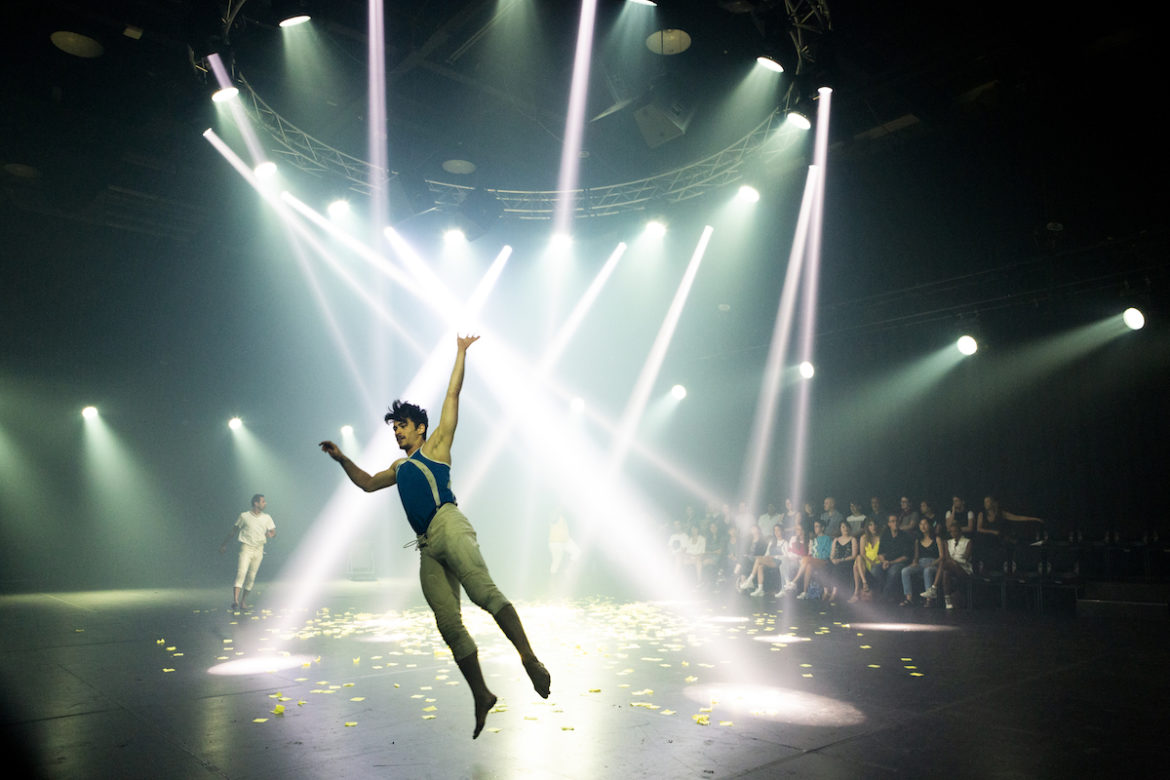Force Majeure’s You Animal, You is full of dramaturgical silences that tear holes in the text, says Robert Reid
Force Majeure’s You Animal, You explores pack behaviour in a competitive environment. The text – developed by Danielle Micich and Heather Mitchell with the cast – and the choreography recall the languages of physical training. The relationships – a mother, her children and her students – are shaped by the gym and the rehearsal room.
The specifics of the competition they’re training for are never clear and they never leave the workout room. Instead, this work evokes the atmosphere of competition and preparation, an atmosphere that feels so cloyingly familiar it can be reconstructed merely with absurdist word games and workout exercises.
The performance hovers in an awkward place between abstract movement, absurd ritual and developing narrative, never quite becoming one or the other. There’s just enough detail to encourage us to fill in the rest, but there’s not enough detail to separate it from the other meta-generic competition narratives that late stage capitalism has conjured for us. Hunger Games. Tron. Star Trek’s holodeck or Blood Bowl.
You Animal, You creates a dojo in an unclear world. What kind of games occur isn’t important: what matter is that before the game you train, and before you train, you warm up.
Before the warm up there is some playful torture, as if among siblings. Girl is trapped inside a giant translucent plastic pillow by Bottom Feeder. All three wear training gear; Boy’s is blue like the innocent promising sky and the other two are a dull grey. At first they seem to be taping up the inside of the air bag from inside, but the boys turn on Girl and seal her inside the bag as she shouts to be freed.
This casual cruelty is broken up when the mother/trainer enters (Hayley McElhinney), taking her place at the top of a tennis umpire’s ladder chair wearing a sparkling gold evening dress which blazes when the lights are focused on it. Mother/Trainer is a sun god in that dress, and she demands toil and sacrifice from her children and vassals/trainees. Like a god, she’s imperious, brutal and ineffable.
Mother/Trainer/God drives the children through a series of physical exercises, calling out motivational statements and playing them off against each other. The relationship between Mother and Daughter is complex, weighted with resentful compliance and broken dreams. McElhinney as the Mother brings nuance and bombast in equal measure, nudging the character towards a more recognisably human monster, and Lauren Langlois brings an exhausted determination to Girl, reminding me of the early training montages of every Karate Kid movie.
I find from early on that there are dramaturgical silences that tear holes in the text and leave gaps in my understanding. How are we to understand this? Is there more here than the internal world of cruelty in competition? Crucial details about the relationships emerge from the mass of ritualistic dialogue at points when it is too late to make use of the information. By the time we learn that Boy is Mother/Trainer’s son and Girl’s brother, I’ve already developed a relationship matrix for them in my head. It’s not a big problem by itself, but it is symptomatic of the many tiny dramaturgical tears in the fabric of the work which make it unsatisfyingly unfocused.
As a metaphor for competition in the animal world it makes sense. The pack mother training her pups to survive in the wild, rendered as a kind of generic local netball or tennis club community where the stakes are life and death: I can see that. But the clarity of this is confused with a “return of the prodigal” story, when Yellow (Ghenoa Gela) returns (again, from somewhere unspecified) to train with them once again.
Yellow is introduced after the death of Bottom Feeder (Raghav Handa), who disappears from the action completely. The training for this new game is vicious, and appears to involve everything up to and including rape and murder. Is Yellow a sister, a former student, a bottom feeder who got out and made good and returned for revenge?
There are a lot of human stories feinted at in this development, offered up into an already blurry equivalence between animals and competitive environments. It skirts uncomfortably closely to the trope in which a person of colour, possessed of special insight or mystical powers, comes to the aid of the white characters in a narrative. I’m confident that’s not the intention of the work, but the broad dramaturgy of the world invites this as a reading.
There is so much stuff, so many things, rhythms, patterns, effects; the moving lights swing around and make impressive spaces for the players to move through, and the performances make an impressive amount of sense out of the elements of the narrative. But something crucial is missing from this world.
These games are seemingly endless. They continue until Boy is killed and reborn and Yellow and Girl seem to kill Mother/Trainer/God. It ends with a cry of “game over!” and a blackout, which feels a little over-literal. Nevertheless, in the dark there’s a lingering sense that the show might restart, resetting back to where it was when we entered.
Nature is a cycle, I guess.
You Animal, You by Force Majeure. Text by Danielle Micich and Heather Mitchell with the cast, directed by Danielle Micich. Music by Kelly Ryall, set and costume by Michael Hankin, lighting design by Damien Cooper, dramaturgy by Sarah Goodes. Performed by Ghenoa Gela, Raghav Handa, Lauren Langlois, Hayley McElhinney and Jack Riley. North Melbourne Town Hall as part of Dance Massive. Closed.

